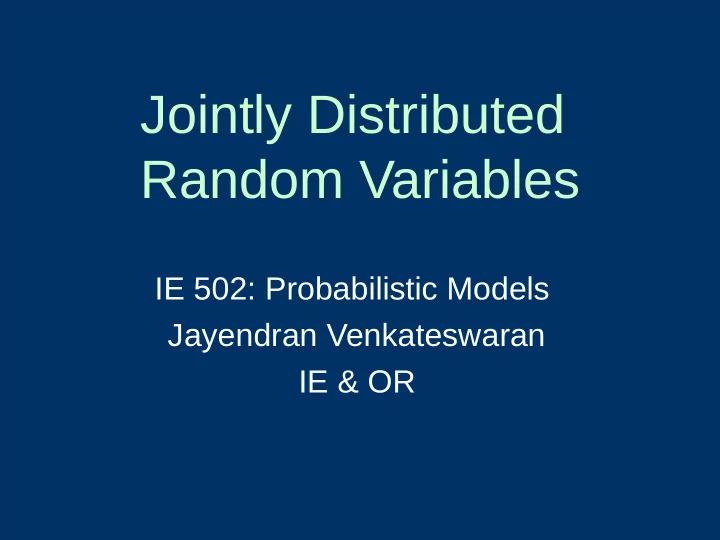

Jointly Distributed Random Variables IE 502: Probabilistic Models Jayendran Venkateswaran IE & OR
Joint Distribution Functions • X and Y are random variables • Joint cumulative distribution function of X and Y – Individual CDFs of X and Y • X & Y are discrete r.v joint probability mass function – Individual pmfs • X & Y are jointly continuous joint probability density function – Individual pdfs
Examples 1. Two balls are drawn from box shown. Let X be the number of red balls & Y be the number of blue balls drawn. Find joint distribution and marginal distributions of X and Y. 2. Suppose X and Y are jointly continuous random variables with joint density f X,Y ( x , y ) = ce x+y for x , y in (-∞, 0] and f X,Y ( x , y ) = 0, otherwise. • What is value of c? • What is the probability X < Y? What are the marginal densities f X and f Y ? •
Properties of Expectations • X and Y are random variables and g is a function of the two variables, then ∑ ∑ g ( x , y ) p ( x , y ) in discrete case y x E[ g ( x , y )] = ∞ ∞ ∫ ∫ g ( x , y ) f ( x , y ) dxdy in continuous case − ∞ − ∞ • Other properties of Expectations • Example: Bernoulli r.v. & Binomial r.v.
Variance and Covariance • Covariance of any two random variables X and Y, is defined as: Cov(X, Y) = • Properties of Covariance • Variance of sum of random variables • Properties of Variance
Independent Random Variables • Random variables X and Y are said to be independent iff, P{X ≤ a, Y ≤ b} = P{X ≤ a}·P{Y ≤ b} • In Example (2), are X and Y independent?
Sums of Random Variables • To determine the distribution of the sum of independent random variables in terms of the distribution of the individual constituents – X & Y are independent r.v – Need to find CDF of Z=X+Y – X & Y are continuous – X has density f X and Y has density f Y
Sum of random variables Calculate density of X+Y for the following cases… a) X and Y are independent r.v., both uniformly distributed on (0, 1). b) X and Y are independent Exponential r.v. with parameter λ. c) X and Y are independent Poisson r.v. with means λ 1 and λ 2 .
Recommend
More recommend